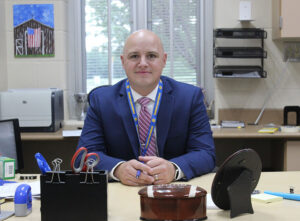Under Review with Adam Loudin (and special guest Kyle Brown): The crisis in officiating
Under Review with Adam Loudin (and special guest Kyle Brown): The crisis in officiating
Share

By Tom Nader
Publisher and Editor
Just like the rest of the country, Ohio has seen a steepening decline in high school and middle school officials.
There are multiple reasons why.
Portage County officials and Portage Sports contributors Adam Loudin and Kyle Brown provide some insight into the growing crisis.
Crisis may seem like a strong word, but in reality, games are being cancelled or postponed at times because of the lack of officials.
Cancelled games impact kids’ opportunities to play, which is why they joined the sport in the first place.
In that regard, if a kid can’t play because of the issue, then crisis is probably not too strong of a word.
Loudin (Waterloo High School graduate) and Brown (Garfield High School graduate) reflect on the state of officiating.
ADAM LOUDIN
Why do you officiate?
How did you get started?
Aren’t you tired of all the yelling and berating from parents and fans?
Have you ever been afraid of getting hurt?
These are questions that myself and other officials have been asked, and we answer time and time again. Unfortunately, the latter two have been more prevalent in the last few years.
Let’s start with the first two questions.
How did I get started in officiating?
 I participated in three sports in high school, and I knew I wanted to stay involved in athletics. I wanted to coach baseball, and I liked watching college football, so when I started, I was only interested in officiating basketball. Before one of our basketball games my senior year, I approached the officials who’re sitting int eh stands and asked them what to do.
I participated in three sports in high school, and I knew I wanted to stay involved in athletics. I wanted to coach baseball, and I liked watching college football, so when I started, I was only interested in officiating basketball. Before one of our basketball games my senior year, I approached the officials who’re sitting int eh stands and asked them what to do.
I got the information I needed and in the fall of 2006, I registered for a basketball officiating class.
Once I started the class, I was hooked.
After I completed the class, I did not work any high school games the first year. I worked youth and recreation leagues to work on my mechanics. I wanted to do my best, and I thought I would practice where no one was watching, but there is no hiding in officiating.
In 2008, I began working junior college basketball. In 2009-10, I began working a full schedule of high school varsity basketball. It was then that Brian Harrell, who is now one of my good friends, convinced me to take the football class. I started officiating football in the fall of 2010. In 2013, I was hired to work Division II and Division III college football, and I was hired by the American Athletic Conference in 2015.
Why do I do it?
Officiating has been one of the greatest endeavors of my life and that is why I continue to do it. I will continue until I am no longer physically able to.
It breeds competition and the pursuit of perfection — two things everyone in any profession chases.
I love officiating because it has given me the opportunity to travel the country and see places and atmospheres that I may have never experienced otherwise.
Obviously, traveling is not for everyone and there are plenty of officials that focus solely on high school and they deserve recognition and commendation for the outstanding job that they do.
The passion that officials have for the game and their craft is very hard to explain to others and it is truly something that one does not understand until they do it.
This is why the shrinking number of officials entering the profession is so alarming.
For example, in 2018, the average age of a football official in his was 51. In baseball it was 52, softball was 58, volleyball was 59 and basketball was 49.
Those averages are seemingly on the rise and many associations are not getting new recruits. One association in Northwest Ohio, which once had 130 football officials before the pandemic, is currently down to 90. To put that in perspective, that is a loss of 40 officials, which is eight complete game crews.
The question becomes: Why are people not getting started?
It may be difficult to pin everything on one reason, but two most likely stand out.
The first is poor treatment from fans and spectators, with the second being low compensation.
On average, most varsity football games pay between $70 to $90, depending on the league. Most basketball games pay between $65 to $80. When I first started, those numbers were $60 to $70 — so in 15 years the fees have not increased. Compared to the increase in fuel, car maintenance costs and the start-up cost ranges between $300 to $600, it is very likely that an official would be lucky to break even in their first season.
Combined with the increased harassment, the amount of people that want to take it on has shrunk.
Fan behavior in the last 10 years has gotten substantially worse. From being harassed from the stands, cursed at and, in some cases, chased to the car or the locker room.
And fan bases grow a reputation. I know official who refuse to go to certain gyms in Portage County because the treatment is poor from fans, and in cases, the support from the school administration is just as bad or worse.
I think a lot of the issues could be fixed.
I think fans need to be more informed on the rules. Schools are required to have a preseason parent meeting for sports. I think officials should be invited to these to help educate.
I also think fans, especially parents, need to be better role models.
At the end of the day, officials have no vested interest or care in who wins a contest.
Do we miss calls? Yes.
Do we miss calls on purpose? No.
Do incorrect calls sometimes affect the outcome of a game? Unfortunately, yes.
However, as long as poor treatment and conditions exist, it will be difficult to recruit officials, and we risk more and more games being cancelled.
KYLE BROWN
(Division I college football official)
There is a definite shortage in officials in all sports — across the entire nation.
I feel like there are a few reasons for this:
- The treatment of officials by coaches, players and fans is extremely poor.
- The interest to become an official is low by nature.
- The time commitment to be successful and do the game justice is more than most people realize.
The first component above, in my opinion, is the leading cause of the shortage of officials.
 People have a lack of appreciation for such a vital piece of the game.
People have a lack of appreciation for such a vital piece of the game.
I want to ensure that every game is played fairly and by the rules — and it is our duty to maintain the integrity of the game.
I enjoy officiating because it allows me to stay involved and be part of the game that I love.
I enjoy the crew camaraderie and the lifelong friendships that I have made with other officials.
Most of the closest and best friends are football officials that I have worked with over the years.
I am also at a point in my career where I get the opportunity to travel and see different college campuses throughout the country, which is really neat.
••••••••••
Editor’s Note: If anyone is interested in learning more about becoming an official for any sport, email tomnader@portagesports.com.





